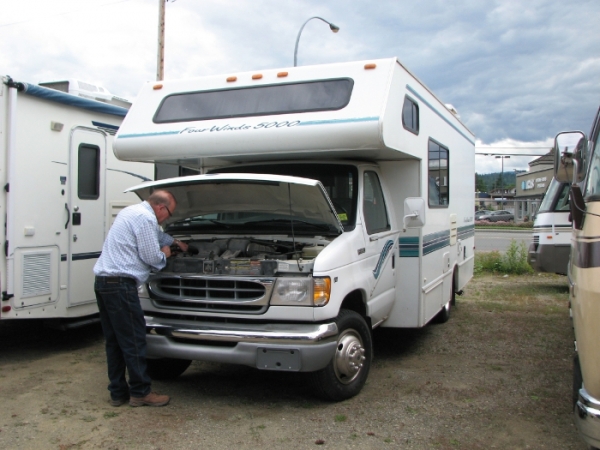1. Remove all food from the RV
Removing all of the food from your RV is an absolute during winter storage. Clear out the fridge and freezer for sure because no power for a few months will mean to refrigeration. Not only should you remove the food from the refrigerator and freezer, but also clean out any tidbits or spills that may be hanging around. Likewise, leave the doors of the refrigerator and freezer open so mildew will not be an issue.
Even non-perishable foods need to be removed from the cabinets and pantry before storage. Even though these foods may have an expiration date far beyond next spring, the extreme fluctuations in temperature can still cause problems. For example, if you leave canned drinks in the pantry, you shouldn't be surprised to come back in the spring to find they have frozen and busted. Plus, any food on board will just be a pest attraction.
2. Ensure all gas appliances are off and the main gas valve is firmly shut off
Do a thorough run through of your RV inside and make sure all appliances that utilize LP gas are turned off. If your RV has a pilot light, extinguish this as well. Check the main valve and turn it off completely and firmly. This will ensure that even if you inadvertently left a gas appliance on, it will not be leaking gas into the cabin.
3. Seal off exterior ventilation
A parked RV is an ideal spot for small creatures to take up residence. Whether it is the exhaust pipes from the back or the vents on the roof, these areas must be sealed off before storage. Through the winter, bird, mice, and other small animals will be looking for these places to create a warm home, and the last thing you want is to come back to your RV in the spring and find that you have a family of rats hiding out in the walls or birds in overhead vents. This doesn't take as much effort as it sounds. Just grab some cardboard and duct tape to cover any exterior openings.
4. Clean up your RV
Any messes left behind in your RV will just get tougher to clean while it sits in storage. Remove all bedding and dirty laundry. That bedding may seem fine to leave behind and that small stack of dirty laundry might not look like such a big deal, but leaving dirty linens and laundry in your RV for the winter will just mean a bigger mess come spring. Take the time to clean up spots and spills in cabinetry, on counters, or on the flooring. Vacuum carpets and area rugs, along with cloth-covered seating.
5. Prepare the plumbing system of your RV
The plumbing system is by far one of the most important components when you are preparing your RV for winter storage. Drain all gray water tanks and water storage tanks completely. Even clean water in the water supply tanks can stagnate over the winter, which would be a huge disaster when you're ready to climb aboard again. Don't forget to also turn on the faucets in the RV to eliminate any remaining water that may be hanging out in the water lines. Keep in mind that you will also have to flush any remaining water from the water heater and the toilet. Likewise, clearing your onboard sewage tank is a must.
Most RV owners take this time to also clean out the holding tanks, which can be accomplished by filling the tanks with clean water and a store-bought cleaning solution or a few cups of bleach and then draining the solution back out. Once all drainage lines and tanks have been cleaned and drained, it is a good idea to use compressed air to blow dry any remaining water droplets left behind.
